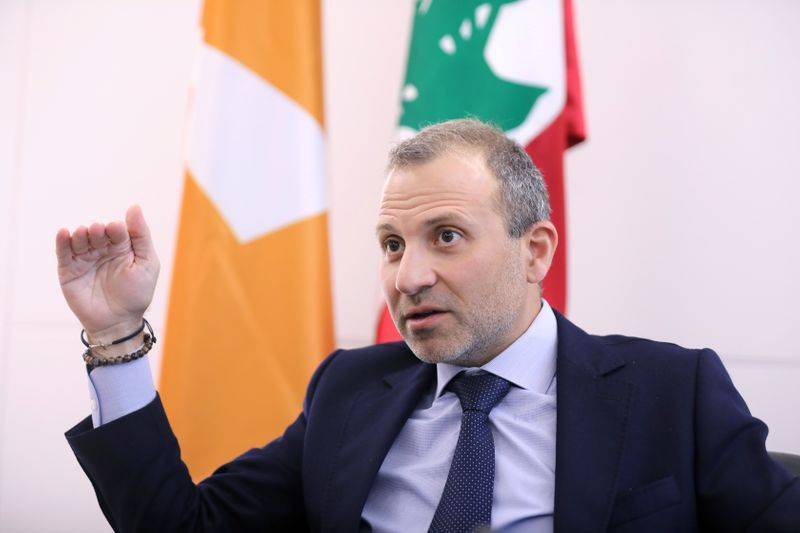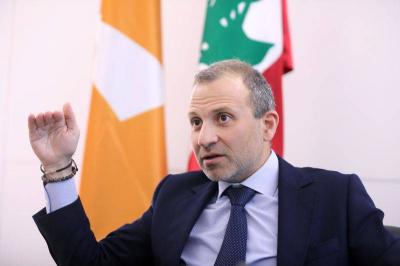Reinforcing the position of former President Michel Aoun, Deputy Gebran Bassil, head of the Free Patriotic Movement, continued the path of divergence from Hezbollah. Until yesterday, what remained of the Mar Mikhael Understanding was consensus on the issue of resistance against Israel to protect the land. The movement's stance on the war led by Hezbollah in the south differed from its position during the July War. In the past, the movement supported its ally in resisting when other parties abandoned him both domestically and abroad. It provided cover for Hezbollah during its participation in the war in Syria and confronted its opposition externally and internally. For many years, the Mar Mikhael Understanding withstood numerous challenges and hurdles, leading to the siege of Michel Aoun's term and sanctions on Bassil. Each time, both parties announced that the agreement was still alive, as reported by "Nidaa al-Watan."
In his televised interview, President Aoun stated two days ago that we are not bound by a defense treaty with Gaza and that those who can link the fronts are the Arab League, which clearly criticized Hezbollah's involvement in the southern front in support of Gaza. Aoun’s stance was echoed by Bassil in his press conference yesterday. He began by appreciating the deterrent equation established by Hezbollah from which the rules of engagement emerged, considering it the sole reason that has thus far prevented Israel from a major aggression against Lebanon. He concluded by stating that we are in favor of defending Lebanon and not in favor of holding the country responsible for liberating Palestine, nor are we in favor of the unification of conflicts; that is, we do not agree to link the cessation of the southern war with the cessation of the Gaza war.
It can be understood that Bassil’s comments reflected the essence of positions that confine the movement within its environment; even within its parliamentary bloc and political body, there are members questioning the wisdom of engaging in the war in the south and fearing its expansion beyond Lebanon's capacity to bear, especially amid the distance of Arab and Western countries from Lebanon and their lack of readiness to assist, either in deterring Israel or contributing to reconstruction.
On several occasions, the head of the movement has had to defend Hezbollah's preemptive war in the south, which has begun to be echoed even by moderates and supporters of "the party." It was generally believed that this war would end within weeks with a settlement that would safeguard Lebanon's rights and help liberate its land, but the expansion of Israel's areas of aggression and the danger of an outbreak of a comprehensive war began to bolster the voices of dissent against this war at a time when Lebanon is suffering from a significant economic crisis, and amid the absence of a president, which doubled the justifications for the movement's stance.
The movement could no longer bear the burden of the delay in electing a president, especially since Hezbollah has ceased discussing this matter and has shifted its focus to the field while the doors of parliament remain closed. As a reward, it has bolstered the position of the caretaker prime minister and supported his appointment as chief of staff after Secretary-General Sayyid Hassan Nasrallah had previously stated that this government was not a government of appointments.
From a Christian perspective, Bassil can no longer bear the overbidding against him, feeling that he is outside the game being played by his ally, which is the game of war and ongoing settlements led by Iran. At a time when Lebanon is distanced from the scene due to the absence of a president and the regional movements, Bassil echoed Bkerke's concerns.
With a style of breaking and then mending, Bassil praised the boldness and wisdom of Sayyid Hassan Nasrallah’s positions, which show a commitment to Lebanon, and he supported the defense of Lebanon. However, he disagreed with Hezbollah on the issue of holding Lebanon responsible for liberating Palestine or linking Lebanon to other fronts, specifically linking the cessation of the southern war to the cessation of the Gaza war.
It can be considered that the Mar Mikhael Understanding has become a thing of the past, and Hezbollah is alone in the field. This is a point that perhaps will not go unnoticed for reasons related to its calculations, representing a significant point of disagreement between the former allies. Hezbollah appears to operate outside the internal consensus, prioritizing its strategic considerations over others, leading to differing interpretations compared to those of its ally.
However, while Aoun's stance seemed to be a rebellion against his alliance with Hezbollah, there are those within the movement who still believe that the agreement on resistance is non-negotiable. According to "Nidaa al-Watan," the objection is towards linking the fronts and fearing that the Gaza war may prolong. The movement agrees, according to its sources, with the party that its arms are for protecting Lebanon, but not Palestine. This means that the movement does not consider itself out of the understanding but rather wanted to remind its ally that their agreement in Mar Mikhael was about protecting Lebanon, not liberating Palestine. This position will provoke various interpretations and analyses that will enhance the disagreements between the allies, although some argue that proceeding towards a separation would be an injustice that does not serve the reality of their relationship.
For its part, Hezbollah praised Bassil's statement, considering it positive regarding the work of the resistance in Lebanon and its defense, while his other stance on the Gaza issue or the Palestinian issue in general is not new.




